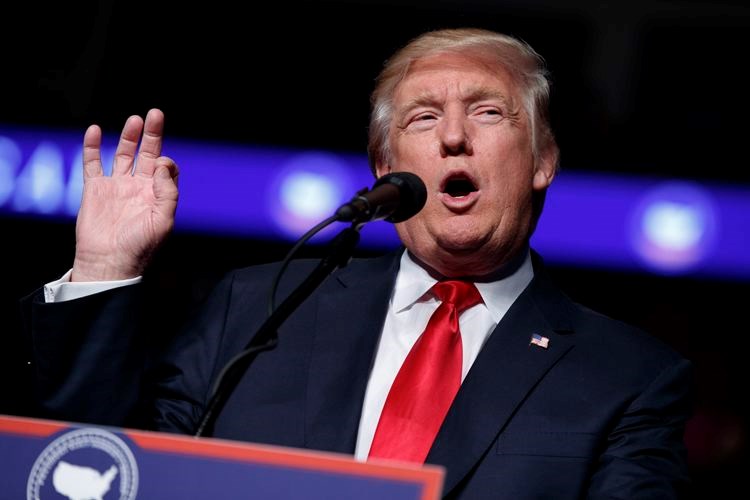U.S. President Donald Trump took over at a time of peace and prosperity, but acted as though the United States were mired in war and recession. His inaugural address painted a bleak picture of "American carnage," with "rusted-out factories," and "crime and gangs."
This litany of exaggerated woes was designed to provide a rationale for an outsider such as Trump to take power.
"I alone can fix it," he promised.
Trump's dystopian vision has become a self-fulfilling prophecy. He began his presidency by creating chaos in the nation's airports with an unnecessary executive order banning immigration from seven majority-Muslim nations whose travelers did not pose an imminent threat. Now, 16 months later, he has created or worsened at least half a dozen major crises.
The only one that is not of Trump's own design is the confrontation with North Korea.
That was sparked by Pyongyang's nuclear and missile tests last year. But Trump heightened the danger by threatening to rain "fire and fury" on "Little Rocket Man."
He then impetuously agreed to parley with Kim Jong Un but, just as impetuously, called off the summit before trying to reinstate it. In so doing, he has heightened uncertainty and confusion. He might thrive on this chaos, but no one else does.
At the same time that Trump is dealing with North Korea, he is also trying to cope with these self-inflicted woes:
The legal crisis. Trump made the biggest mistake of his presidency by firing FBI Director James Comey, thereby leading to the appointment of a special counsel. To protect himself from prosecution, Trump has waged a scorched-earth campaign against the Justice Department, the FBI and the special counsel's office. This is an unprecedented challenge to the rule of law that could yet result in impeachment.
The Iran crisis. Trump pulled out of the nuclear deal even though his own secretary of state admitted that Iran was abiding by its terms. Trump hopes the imposition of unilateral U.S. sanctions will bring Iran back to the bargaining table, but it's just as likely that the mullahs could accelerate their nuclear program and their regional aggression.
The China crisis. It's true that China engages in unfair trade practices and steals U.S. intellectual property, but there is no reason to bring the U.S.-China relationship to the brink right now. Even Trump's own U.S. trade representative admits that "cyber intrusions against U.S. firms by Chinese state-sponsored and supported hackers... have decreased or become more difficult to detect" after a 2015 cybersecurity agreement between President Barack Obama and Chinese President Xi Jinping.
What hasn't decreased are the benefits that the United States derives from commerce with China. Yet now this mutually beneficial relationship is imperiled by Trump's imposition of 25 per cent tariffs on steel and 10 per cent on aluminum and his threats to sanction a much wider array of goods.
One of Trump's goals - to reduce theft of intellectual property - is reasonable, but he has undercut it by lifting sanctions on Chinese telecom giant ZTE even though it is accused of 380 violations of U.S. laws. His other goal - to cut the trade deficit by $200 billion - is unreasonable, because the United States simply can't produce that many additional goods to sell to China. Beijing's retaliation is sure to hurt the United States, starting with major companies such as Apple whose supply chains depend on Chinese factories.
The European crisis. Trump has given our European allies the middle finger by pulling out of the Paris climate accord and the Iran nuclear deal while applying steel and aluminum tariffs to European firms. Europe is retaliating with sanctions of its own and is considering action to undercut U.S. sanctions on Iran. Donald Tusk, president of the European Council, recently tweeted: "Looking at latest decisions of @realdonaldtrump someone could even think: with friends like that who needs enemies."
This transatlantic rift is a gift to Russia that amply repays Vladimir Putin's investment in helping the Trump campaign.
The North America crisis. Trump insisted on renegotiating the North American Free Trade Agreement (NAFTA) for no good reason. Now the talks have reached an impasse because of U.S. demands that the deal expire in five years, and Trump is imposing steel and aluminum tariffs on Canada and Mexico, by claiming that they pose a national-security threat.
Even the steelworkers' union opposes this move, because the United States and Canadian steel industries are so integrated. Canada and Mexico, like the European Union, are retaliating with their own tariffs.
Any one of these challenges would be difficult enough to solve in isolation; taken together, they would be nearly insurmountable even for an administration far more adept than this one.
The carnage is coming - and it's all Trump's doing.
-- Max Boot is the Jeane J. Kirkpatrick senior fellow for national security studies at the Council on Foreign Relations and a global affairs analyst for CNN.


.png;w=120;h=80;mode=crop)
